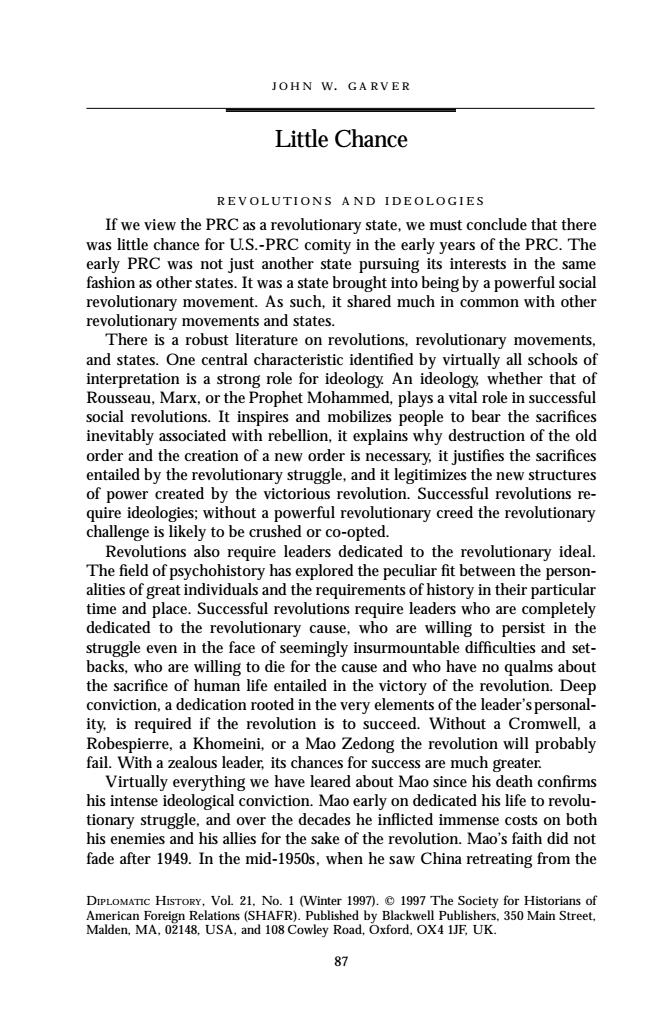正在加载图片...

JOHN W.GARVER Little Chance REVOLUTIONS AND IDEOLOGIES If we view the PRC as a revolutionary state,we must conclude that there was little chance for U.S.-PRC comity in the early years of the PRC.The early PRC was not just another state pursuing its interests in the same fashion as other states.It was a state brought into being by a powerful social revolutionary movement.As such,it shared much in common with other revolutionary movements and states. There is a robust literature on revolutions,revolutionary movements, and states.One central characteristic identified by virtually all schools of interpretation is a strong role for ideology.An ideology.whether that of Rousseau,Marx,or the Prophet Mohammed,plays a vital role in successful social revolutions.It inspires and mobilizes people to bear the sacrifices inevitably associated with rebellion,it explains why destruction of the old order and the creation of a new order is necessary,it justifies the sacrifices entailed by the revolutionary struggle,and it legitimizes the new structures of power created by the victorious revolution.Successful revolutions re- quire ideologies;without a powerful revolutionary creed the revolutionary challenge is likely to be crushed or co-opted. Revolutions also require leaders dedicated to the revolutionary ideal. The field of psychohistory has explored the peculiar fit between the person- alities of great individuals and the requirements of history in their particular time and place.Successful revolutions require leaders who are completely dedicated to the revolutionary cause,who are willing to persist in the struggle even in the face of seemingly insurmountable difficulties and set- backs,who are willing to die for the cause and who have no qualms about the sacrifice of human life entailed in the victory of the revolution.Deep conviction,a dedication rooted in the very elements of the leader's personal- ity.is required if the revolution is to succeed.Without a Cromwell,a Robespierre,a Khomeini,or a Mao Zedong the revolution will probably fail.With a zealous leader,its chances for success are much greater. Virtually everything we have leared about Mao since his death confirms his intense ideological conviction.Mao early on dedicated his life to revolu- tionary struggle,and over the decades he inflicted immense costs on both his enemies and his allies for the sake of the revolution.Mao's faith did not fade after 1949.In the mid-1950s,when he saw China retreating from the DIPLOMATIC HIsToRY,Vol.21.No.1 (Winter 1997).1997 The Society for Historians of American Foreign Relations(SHAFR).Published by Blackwell Publishers,350 Main Street, Malden,MA,02148.USA,and 108 Cowley Road,Oxford,OX4 1JF,UK. 87J O H N W. G A R V E R Little Chance R E V O L U T I O N S A N D I D E O L O G I E S If we view the PRC as a revolutionary state, we must conclude that there was little chance for U.S.-PRC comity in the early years of the PRC. The early PRC was not just another state pursuing its interests in the same fashion as other states. It was a state brought into being by a powerful social revolutionary movement. As such, it shared much in common with other revolutionary movements and states. There is a robust literature on revolutions, revolutionary movements, and states. One central characteristic identified by virtually all schools of interpretation is a strong role for ideology. An ideology, whether that of Rousseau, Marx, or the Prophet Mohammed, plays a vital role in successful social revolutions. It inspires and mobilizes people to bear the sacrifices inevitably associated with rebellion, it explains why destruction of the old order and the creation of a new order is necessary, it justifies the sacrifices entailed by the revolutionary struggle, and it legitimizes the new structures of power created by the victorious revolution. Successful revolutions require ideologies; without a powerful revolutionary creed the revolutionary challenge is likely to be crushed or co-opted. Revolutions also require leaders dedicated to the revolutionary ideal. The field of psychohistory has explored the peculiar fit between the personalities of great individuals and the requirements of history in their particular time and place. Successful revolutions require leaders who are completely dedicated to the revolutionary cause, who are willing to persist in the struggle even in the face of seemingly insurmountable difficulties and setbacks, who are willing to die for the cause and who have no qualms about the sacrifice of human life entailed in the victory of the revolution. Deep conviction, a dedication rooted in the very elements of the leader’s personality, is required if the revolution is to succeed. Without a Cromwell, a Robespierre, a Khomeini, or a Mao Zedong the revolution will probably fail. With a zealous leader, its chances for success are much greater. Virtually everything we have leared about Mao since his death confirms his intense ideological conviction. Mao early on dedicated his life to revolutionary struggle, and over the decades he inflicted immense costs on both his enemies and his allies for the sake of the revolution. Mao’s faith did not fade after 1949. In the mid-1950s, when he saw China retreating from the DIPLOMATIC HISTORY, Vol. 21, No. 1 (Winter 1997). q 1997 The Society for Historians of American Foreign Relations (SHAFR). Published by Blackwell Publishers, 350 Main Street, Malden, MA, 02148, USA, and 108 Cowley Road, Oxford, OX4 1JF, UK. 87